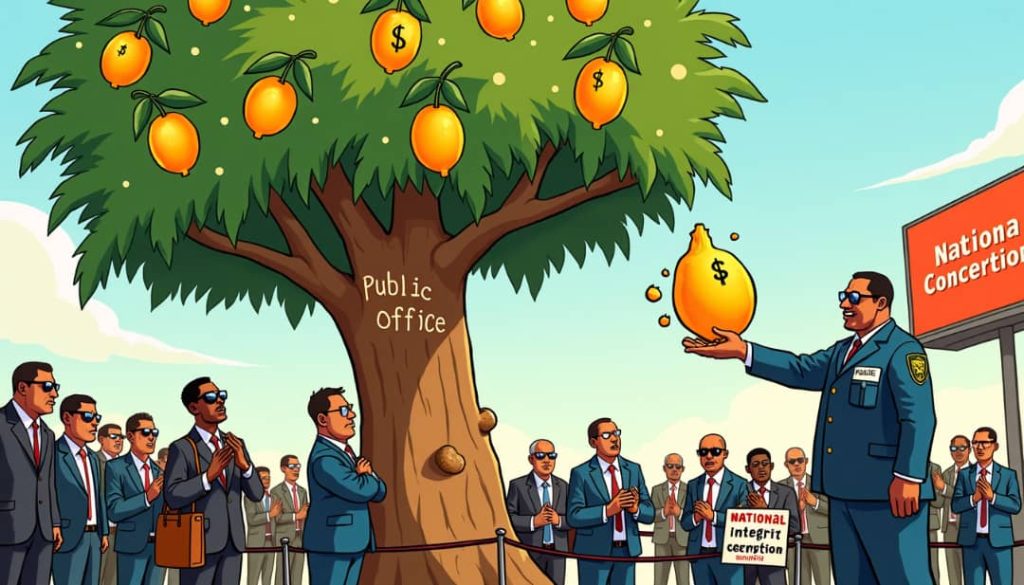Public office in Ghana is like a mango tree in your neighbour’s house. You didn’t plant it, you didn’t water it, but when the fruit ripens, your only job is to climb, pluck, and share the spoils — preferably before the neighbour notices the tree was ever theirs.
In this beloved Republic of Ghana, corruption no longer hides under desks or behind curtains. It wears a three-piece suit, holds a press conference, waves politely, and proceeds to collect its share before the meeting even starts.
We have turned corruption into an art form — off-key, yet performed with such national confidence that even the audience forgets they’re being robbed mid-performance.
Public office in Ghana is like a mango tree in your neighbour’s house. You didn’t plant it, you didn’t water it, but when the fruit ripens, your only job is to climb, pluck, and share the spoils — preferably before the neighbour notices the tree was ever theirs.
We condemn corruption passionately. We mount platforms, we quote scriptures, we shake our heads so hard you’d think integrity is suffering an earthquake. But behind the scenes? Envelopes slide like skilful midfield passes. Policemen’s palms open wider than offertory baskets on Easter Sunday. Contracts change owners faster than fuel prices at the pump.
The Ghanaian Paradox: Condemning Corruption by Day, Funding It by Night
Here, even schoolchildren graduate with two compulsory subjects: how to recite the national anthem, and how to “see somebody inside” when systems fail you. You don’t need the Holy Spirit to secure a land title — but a cousin at Lands Commission is highly recommended. To pass your driving test, divine intervention is optional — an envelope, however, is non-negotiable.
We love to fight corruption — especially on paper. Ghana has produced more anti-corruption conferences than it has boreholes. We draft action plans, sip mineral water, exchange handshakes, and leave the venue with corruption alive and well… often parked outside in a government vehicle.
Ghana’s Most Successful Export? Corruption, of Course
Forget cocoa, gold, or even Azonto. Corruption is our most reliable non-traditional export. It travels across borders, picks up foreign accents, and returns home in time for December weddings and political campaigns.
We are experts in selective outrage. We condemn corruption on radio, then endorse it in traffic. We post scriptures online, then post bail for corrupt relatives offline. Our hypocrisy is so organised it deserves its own secretariat.
But all hope isn’t lost — after all, this is the same Ghana that survived dumsor, championed mobile money expansion, and produced trotro slogans wise enough to replace university lectures.
As the elders say, “If you want to expose what hides in the shadows, shine a brighter light.” It’s time we flood corruption’s hiding places with technology, transparency, and unapologetic citizen action — not more hotel conferences with heavy buffets and light resolutions.
The Uncomfortable Truth We’re All Dodging
The real question? Is corruption Ghana’s incurable disease, or have we simply found ways to coexist — like malaria, annoying but familiar, deadly but manageable with small brown envelopes?
Our anti-corruption efforts often feel like washing our hands in the rain — impressive at first glance, but entirely pointless if we keep walking barefoot through the same muddy fields of impunity.
The next Integrity Conference is on the horizon. The jollof rice will be excellent, the speeches will be firm, and the declarations grand. But when the dust settles, Ghana must decide: will we keep singing this off-key anthem, or finally change the tune?
Time — and the next corruption exposé — will tell.
DISCLAIMER: The Views, Comments, Opinions, Contributions and Statements made by Readers and Contributors on this platform do not necessarily represent the views or policy of Multimedia Group Limited.
DISCLAIMER: The Views, Comments, Opinions, Contributions and Statements made by Readers and Contributors on this platform do not necessarily represent the views or policy of Multimedia Group Limited.


